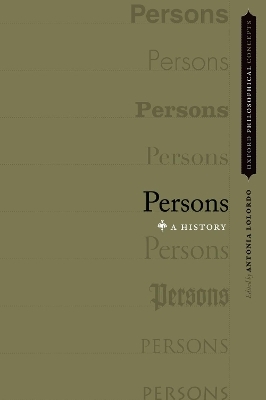
Persons
A History
Seiten
2019
Oxford University Press Inc (Verlag)
978-0-19-063439-1 (ISBN)
Oxford University Press Inc (Verlag)
978-0-19-063439-1 (ISBN)
This volume provides a genealogy of the concept of a person. By asking when and why the concept of a person came into existence, it explains what the concept of a person is and how it differs from the concept of a human being and the concept of a self.
What is a person? Why do we count certain beings as persons and others not? How is the concept of a person distinct from the concept of a human being, or from the concept of the self? When and why did the concept of a person come into existence? What is the relationship between moral personhood and metaphysical personhood? How has their relationship changed over the last two millennia?
This volume presents a genealogy of the concept of a person. It demonstrates how personhood--like the other central concepts of philosophy, law, and everyday life--has gained its significance not through definition but through the accretion of layers of meaning over centuries. We can only fully understand the concept by knowing its history. Essays show further how the concept of a person has five main strands: persons are particulars, roles, entities with special moral significance, rational beings, and selves. Thus, to count someone or something as a person is simultaneously to describe it--as a particular, a role, a rational being, and a self--and to prescribe certain norms concerning how it may act and how others may act towards it. A group of distinguished thinkers and philosophers here untangle these and other insights about personhood, asking us to reconsider our most fundamental assumptions of the self.
What is a person? Why do we count certain beings as persons and others not? How is the concept of a person distinct from the concept of a human being, or from the concept of the self? When and why did the concept of a person come into existence? What is the relationship between moral personhood and metaphysical personhood? How has their relationship changed over the last two millennia?
This volume presents a genealogy of the concept of a person. It demonstrates how personhood--like the other central concepts of philosophy, law, and everyday life--has gained its significance not through definition but through the accretion of layers of meaning over centuries. We can only fully understand the concept by knowing its history. Essays show further how the concept of a person has five main strands: persons are particulars, roles, entities with special moral significance, rational beings, and selves. Thus, to count someone or something as a person is simultaneously to describe it--as a particular, a role, a rational being, and a self--and to prescribe certain norms concerning how it may act and how others may act towards it. A group of distinguished thinkers and philosophers here untangle these and other insights about personhood, asking us to reconsider our most fundamental assumptions of the self.
Antonia LoLordo is Professor of Philosophy at the University of Virginia. She specializes in early modern philosophy. She is the author of Locke's Moral Man (Oxford, 2012) and Pierre Gassendi and the Birth of Early Modern Philosophy (Cambridge, 2007).
| Erscheinungsdatum | 23.08.2019 |
|---|---|
| Reihe/Serie | Oxford Philosophical Concepts |
| Verlagsort | New York |
| Sprache | englisch |
| Maße | 208 x 137 mm |
| Gewicht | 499 g |
| Themenwelt | Geisteswissenschaften ► Philosophie ► Ethik |
| Geisteswissenschaften ► Philosophie ► Geschichte der Philosophie | |
| Geisteswissenschaften ► Philosophie ► Philosophie der Neuzeit | |
| Sozialwissenschaften | |
| ISBN-10 | 0-19-063439-1 / 0190634391 |
| ISBN-13 | 978-0-19-063439-1 / 9780190634391 |
| Zustand | Neuware |
| Haben Sie eine Frage zum Produkt? |
Mehr entdecken
aus dem Bereich
aus dem Bereich
unsere kollektive Verantwortung
Buch | Hardcover (2023)
wbg Theiss in Wissenschaftliche Buchgesellschaft (WBG) (Verlag)
CHF 46,90


